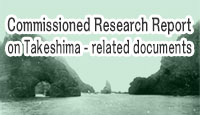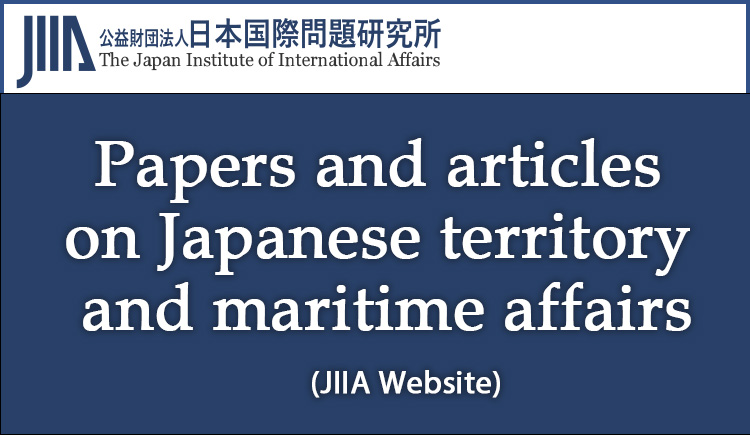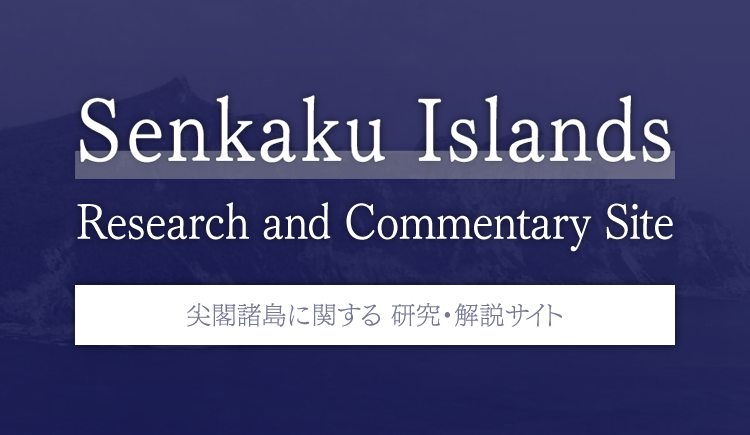The documents and materials published on this website were collected, researched, and prepared with advice from experts, as a part of a Government-commissioned project. The contents of this website do not reflect the views of the Government. Links to external sites (domains other than https://www.cas.go.jp) are not under the management of this site. For linked websites, please check with the organization/group that manages the website for the link in question.
Analysis of claims by other countries
Column The legal consequences of diplomatic protests in modern international community, and the proposal to refer the matter to an international tribunal Prolonged “illegal occupation” by the Republic of Korea produces no legal consequences under international law
Tetsuya Nakano (Professor, Faculty of Law, Kansai University)
*Adobe Acrobat Reader DC, provided by Adobe, is needed to view the PDF files. If you do not have the software, please download it from the linked site. Adobe Acrobat Reader DC
Will continued “illegal occupation” change into “valid control”?
More than 60 years have passed since the illegal occupation of Takeshima by the Republic of Korea. During this time, Japan had proposed to Korea the referral of the Takeshima issue to the International Court of Justice in 1954, 1962, and 2012. Moreover, while Japan has protested verbally or in writing time and again, Korea has only strengthened its opposition and taken action to make the illegal occupation into an established fact. Hence, none of Japan’s efforts have borne fruit.
Faced with the continued deadlock, some tend to question the effectiveness of Japan’s response. In other words, as Japan’s measures consist only of diplomatic protests which are not accompanied by legal force, they suspect that these measures may have ended in being no more than a, so to say, “paper protest.” From the perspective of a third country, such passive measures that only amount to the diplomatic expression of Japan’s intentions might possibly be regarded as Japan’s acquiescence in Korea’s sovereignty over Takeshima. As a result, some are concerned that even though Japan has sufficient grounds to exercise its sovereignty over Takeshima (= title to territory) and Korea’s occupation is “without title” (= illegal occupation), to begin with, this illegal occupation, if further prolonged without any actual measures by Japan to change the situation, may lead to the transfer of title to cause “occupancy based on title” (= valid control).
Prescription as a form of title to territory
There are certainly some cases in international law in which continued occupation by a country has resulted in the recognition of the transfer of territorial title to this country. For example, prescription, which is one of the traditional modes of territorial title, could be the basis for this. In prescription, occupation of a country’s territory by another country can be effected by possessing it (i) as a sovereign ruler, (ii) peacefully and without interruption, (iii) openly, and (iv) for a certain period of time. Activities by private individuals alone do not suffice. Moreover, possession must be “peaceful and without interruption”— in short, carried out continuously without protest from other countries. Such occupation will inevitably be carried out “openly.” With regard to the period of time, while there is a treaty that prescribes a period of 50 years (Treaty of Arbitration between Great Britain and the United States of Venezuela, Washington D.C., 2 February 1897), it is generally understood that when the requirements (i) to (iii) are satisfied, (iv) will also be satisfaied. Accordingly, the period varies from case to case depending on the relevant facts. In this way, unlike the prescription system under domestic law, the prescription system under international law is characterized by the fact that an applicable period is generally not prescribed.
As prescription applies to the territory of another country, it is distinguished from occupation that applies to terra nullius. The defect of act is cured with consent of the title-holding state, whereby international order and stability of international relations are maintained. Many writers of international law have found in this point the significance of prescription as a mode of title to territory
Reasons for the interruption of prescription
- Effect of proposing the referral of the matter to an
international tribunal
As explained above, “peaceful” refers to a state in which there has been no protest from other countries for a certain period of time. The absence of protest on the part of the title-holding state is deemed as its having granted consent to the state occupying the territory without any title. In consequence, it also becomes an effective and absolute title toward a third state. Therefore, such occupation is not considered “peaceful” in the case where it is maintained by force in the face of strong opposition from other states.
Could we say that protests raised through diplomatic channels alone are sufficient for overruling the presumption of consent, or in other words, interrupting prescription? In the modern international community, because there are such means of resolving international disputes as referring them to the United Nations and the International Court of Justice, there could be a theory that protests through diplomatic channels alone are inadequate, and that prescription is not interrupted unless all means are exhausted. Let us consider the point in comparison with this viewpoint.
First, let us look at an old case of international arbitration in the early 20th century that considered the causes for the interruption of prescription.
In a dispute that arose between the United States and Mexico as to sovereignty over a territory known as El Chamizal, the two countries agreed to refer the dispute to the International Boundary and Water Commission (“the Commission”). The Commission stated, “In private law, the interruption of prescription is effected by a suit, but in dealings between nations this is of course impossible, unless and until an international tribunal is established for such purpose.” Furthermore, with regard to the fact that Mexico had not attempted to possess the disputed territory by force, it stated that “the result of any attempt to do so would have provoked scenes of violence and the Republic of Mexico cannot be blamed for resorting to the milder forms of protest contained in its diplomatic correspondence.” Hence, as Mexico had done all that could be reasonably required of it by way of protest, and had filed claims within a suitable period of time since the start of activities by the Commission, the United States’ resort to prescription was deemed to be ineffective. This award was made in 1911, but the principle of prohibition on use of force had not been established at the time, and conquest had been considered to be a valid title. Even so, it is worth noting that the need to adopt some form of forcible resistant action, as described above, was not recognized. Even at that time, it was thought that prescription could be interrupted in cases where a state did not exercise force but only lodged protests in order to avoid “provok[ing] scenes of violence.”
On the other hand, as it could be said after the establishment of the Permanent Court of International Justice that at least for the parties to its Statute, to file a suit can interrupt prescription and for non-parties to the Statute, to refer the matter to a third-party can do so, it may be said that the ruling of the Commission could be interpreted to mean that repeated protests alone cannot prevent prescription from taking effect. Because while stating that interruptions of prescription by a suit is impossible in dealings between nations, the ruling attaches the condition “unless and until an international tribunal is established for such purpose” and mentions the filing of the suit with the Commission as a dispute resolution organization as a ground for prevention of prescription.
In any case, theories and judicial precedents are in accord in that at least referral to a third-party organization is a reason for interrupting prescription. However, one would be hesitant to interpret this as an indispensable requirement for the interruption of prescription. If the non-presumption of consent is sufficient for interrupting prescription, it would be sufficient to make known the will to not consent by protest through diplomatic channels. Hypothetically, if it were obligatory for a state to refer the dispute to an international court such as the Permanent Court of International Justice or the International Court of Justice in order to interrupt prescription, the state would always be forced to do so unilaterally even when there is no possibility of a trial without the consent of the other party to act jointly. In the case of a territorial dispute, state whose territory is being occupied illegally would have to draw up a application under the situation in which it is unable to gain the consent of the other state, or cannot expect to gain such consent in the near future. This would impose an excessive burden on only one of the parties. Such a view completely ignores the current situation of the international community where even the International Court of Justice has not established an adequate level of compulsory jurisdiction, and is therefore unreasonable. Considering that such a view was true, the proposal to refer the matter to an international court suffices, because it clearly indicates non-consent to the transfer of title to the other state.
Takeshima
Research and Commentary Site
- I Comprehensive issues
- II Commentary on themes by historical period
- III Analysis of claims by other countries





